

Colonising Egypt, With a new preface - Timothy Mitchell. Liberalism, Imperialism, and the Historical Imagination. Nineteenth-Century Visions of a Greater Britain Theodore Koditschek, University of Missouri, Columbia Publication date:March 2011 368pages Dimensions: 228 x 152 mm Weight: 0.71kg In stock.
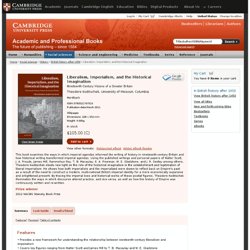
Ends of British Imperialism. 5.0 out of 5 stars An excellent collection of essays from a great scholar 8 Oct 2006 William Roger Louis is a giant among scholars of British imperialism.
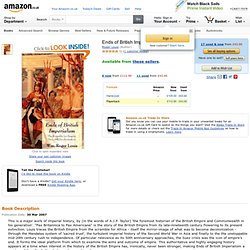
The editor of the "Oxford History of the British Empire", for nearly half a century his scholarship has helped define the field. Theodore koditschekon empire and the historical imagination « settler colonial studies blog. Theodore koditschekon empire and the historical imagination 07Dec11 Theodore Koditschek, Liberalism, Imperialism, and the Historical Imagination: Nineteenth-Century Visions of a Greater Britain (Cambridge: Cambridge University Press, 2011).
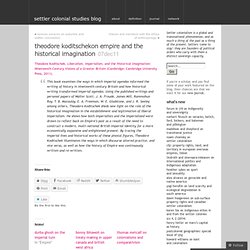
This book examines the ways in which imperial agendas informed the writing of history in nineteenth-century Britain and how historical writing transformed imperial agendas. Using the published writings and personal papers of Walter Scott, J. A. Like this: Like Loading... Pitts, J.: A Turn to Empire: The Rise of Imperial Liberalism in Britain and France. A dramatic shift in British and French ideas about empire unfolded in the sixty years straddling the turn of the nineteenth century.
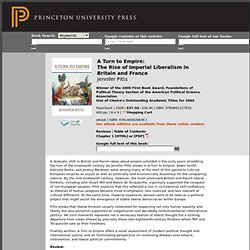
As Jennifer Pitts shows in A Turn to Empire, Adam Smith, Edmund Burke, and Jeremy Bentham were among many at the start of this period to criticize European empires as unjust as well as politically and economically disastrous for the conquering nations. Mantena, K.: Alibis of Empire: Henry Maine and the Ends of Liberal Imperialism. Alibis of Empire presents a novel account of the origins, substance, and afterlife of late imperial ideology.
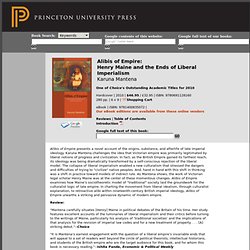
Karuna Mantena challenges the idea that Victorian empire was primarily legitimated by liberal notions of progress and civilization. In fact, as the British Empire gained its farthest reach, its ideology was being dramatically transformed by a self-conscious rejection of the liberal model. The collapse of liberal imperialism enabled a new culturalism that stressed the dangers and difficulties of trying to "civilize" native peoples. And, hand in hand with this shift in thinking was a shift in practice toward models of indirect rule. J. A. Hobson, Imperialism. A Study (1902) Quibbles about the modern meaning of the term Imperialism are best resolved by reference to concrete facts in the history of the last thirty years.
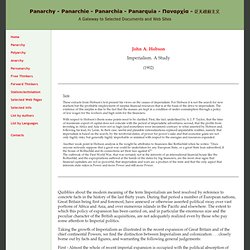
During that period a number of European nations, Great Britain being first and foremost, have annexed or otherwise asserted political sway over vast portions of Africa and Asia, and over numerous islands in the Pacific and elsewhere. Hobson and Imperialism : Hobson and Imperialism Oxford Scholarship Online. Abstract The year 2002 saw the centenary of J.
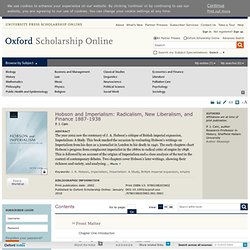
A. Hobson's critique of British imperial expansion, Imperialism: A Study. This book marked the occasion by evaluating Hobson's writings on Imperialism from his days as a journalist in London to his death in 1940. The early chapters chart Hobson's progress from complacent imperialist in the 1880s to radical critic of empire by 1898. J.A. Hobson: Imperialism, A Study (1902) MIA > Archive > Hobson.
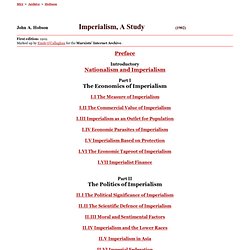
Adam Curtis - Bodybuilding and Nation-building. Chatterjee, P.: The Black Hole of Empire: History of a Global Practice of Power. The Ends of British Imperialism: The Scramble for Empire, Suez and Decolonization. Louis is arguably the preeminent scholar in the field of British imperial history -- and is surely so among those who write on British imperial ventures in the Middle East.
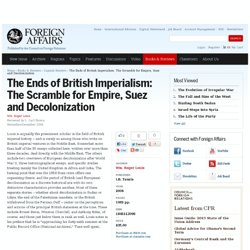
Somewhat more than half of the 35 essays collected here, written over more than three decades, deal directly with the Middle East. The others include two overviews of European decolonization after World War II, three historiographical essays, and specific studies treating mainly the United Kingdom in Africa and India.
The turning point that was the 1956 Suez crisis offers one organizing theme, and the period of British (and European) decolonization as a discrete historical era with its own distinctive characteristics provides another. The Black Hole of Empire. The Irish famine: Opening old wounds. The Graves are Walking: The Great Famine and the Saga of the Irish People.
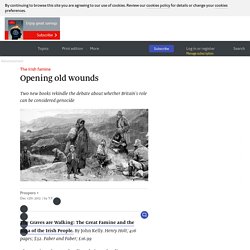
By John Kelly. Henry Holt; 416 pages; $32. Faber and Faber; £16.99 The Famine Plot: England’s Role in Ireland’s Greatest Tragedy. By Tim Pat Coogan. Annals of Settler Colonialism: British Atrocities in Post-War Kenya. The anti-colonial movement in Kenya of the 1950s was mythologized by the British as a shadowy ‘Mau-Mau,’ an irrational outbreak of aimless hatred. In fact, the movement was protesting the confinement of Kenyans to ‘reserves,’ their crowding into urban slums, the privileged position of white British settlers, and the latters’ plan to go on ruling over 6 million Africans with an iron fist.
Of the 15,000 Kenyans that the British summarily rounded up, many were tortured, castrated, and raped. On the basis of declassified colonial documents proving abuse, four Kenyan survivors sued the British government for reparations. You wonder if the settler-colonial officials who ordered castration of freedom fighters were aware of its symbolic purport for their enterprise.